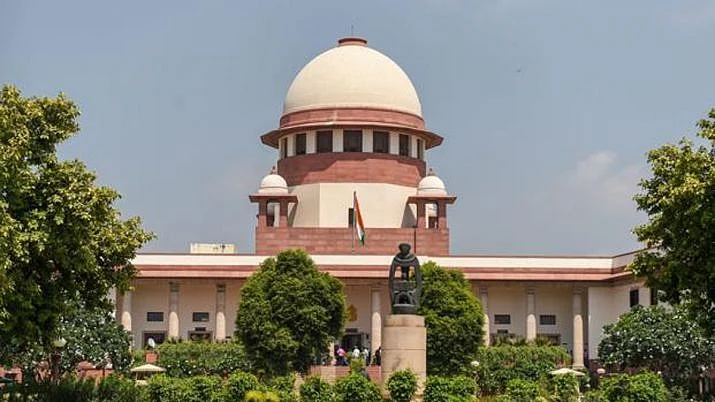Supreme Court refuses to pass orders to restore 4G net in J&K, asks a govt committee to examine issue
The petitioners had submitted that slow internet speed in Kashmir, as opposed to 4G speed available in rest of the country, hampered the ‘Right to education’ and ‘Right to healthcare’<i> </i>in the region

The Supreme Court on Monday directed the setting up of a High Powered Committee to address concerns surrounding the restrictions on 4G internet services in Jammu & Kashmir. With this direction, the court disposed of a batch of petitions challenging the imposition of restrictions in the Valley, legal news website Barandbench.com reported.
This Committee will be headed by the Secretary, Union Ministry of Home Affairs (MHA), and will also comprise the Secretary, Communications and the Chief Secretary of the Jammu & Kashmir administration. The panel will look into the contentions raised by the petitioners before the Supreme Court.
While passing its order, the court expressed a need to ensure balance between national security as well as human rights of people in the region.
The Bench of Justices NV Ramana, Subhash Reddy and BR Gavai had reserved orders in the pleas for restoration of 4G services in the Valley on May 4.
The petitioners had submitted that the slow internet speed in Kashmir, as opposed to 4G speed available in the rest of the country, hampered the "Right to education" and "Right to healthcare" in the region.
During the hearing, the government cited grounds of national security for the move to snap 4G internet in Kashmir.
The Supreme Court was first seized of the matter when NGO ‘Foundation For Media’ Professionals had filed a PIL seeking restoration of 4G services in Jammu & Kashmir. Later, the Private Schools Association of Jammu & Kashmir, an umbrella body of over 2,200 private schools across the region, challenged a series of government orders passed since January 18, 2020, restricting internet speed in the newly created Union Territory.
Another plea by Advocate Soayib Qureshi arguing as petitioner-in-person stated that if security is an issue, then social media sites can be restricted.
On April 27 this year, the Jammu & Kashmir administration had notified that presently prevailing internet access restrictions in the Union Territory will continue to remain in force until May 11.
On April 30, the administration had told Supreme Court that right to internet access is not a fundamental right and the state can curtail the freedom of speech and right to trade through internet.
The administration opposed the restoration of 4G services in the union territory, saying a very reasonable quantum of restrictions have been imposed by reducing the speed of internet to protect the sovereignty, integrity and security of the country.
However, Senior Advocate Huzefa Ahmadi, arguing for Foundation for Media Professionals, asserted that the 2G internet speed was infringing upon the Right to Healthcare of citizens and was leaving doctors without access to technology needed to combat COVID-19. He said, "In J&K, as on today there are 701 COVID-19 cases and 8 deaths. When this petition was filed there were about 33 cases. Today it has escalated. 4G restriction has led to problems being faced by doctors who cannot access information about COVID treatment which is extremely necessary. Almost 75 doctors have also made a representation to the J&K govt flagging the same concerns".
In its reply to the petitions seeking faster internet connectivity, the government had replied stating that the “Right to access internet is not a fundamental right” and that the “Right to carry on trade and profession through internet can be curtailed.”
"Right to access the internet is not a fundamental right and thus the type and breadth of access for exercising the right to freedom of speech and expression under Article 19(1)(a) and/or to carry on any trade or business under Article 19(1)(g) of the Constitution of India (CoI) through the medium of internet can be curtailed. It is submitted that the sovereignty and integrity of India, the security of the State, public order or incitement to an offence, would certainly warrant curtailing the freedom of speech and expression, under Article 19(2)," said the affidavit filed by government in Supreme Court
Senior Advocate Ahmadi contended that students from J&K have to compete with students from across the country but could not do so, as "video conferencing was useless for them."
Senior Advocate Salman Khurshid, appearing for one of the petitioners, had argued that private schools are under government directions to provide education via video-conferencing. "We have an obligation under Right to education to provide education," said Khurshid.
However, the J&K government argued that the primary concern on which the internet speed restrictions were put in place was security. Attorney General KK Venugopal submitted that a faster internet speed like that of 4G would give the enemy information even about the "troop movements."
Follow us on: Facebook, Twitter, Google News, Instagram
Join our official telegram channel (@nationalherald) and stay updated with the latest headlines
Published: 11 May 2020, 1:06 PM
